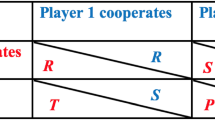Abstract
This study reports a laboratory experiment wherein subjects play a hawk–dove game. We try to implement a correlated equilibrium with payoffs outside the convex hull of Nash equilibrium payoffs by privately recommending play. We find that subjects are reluctant to follow certain recommendations. We are able to implement this correlated equilibrium, however, when subjects play against robots that always follow recommendations, including in a control treatment in which human subjects receive the robot “earnings.” This indicates that the lack of mutual knowledge of conjectures, rather than social preferences, explains subjects’ failure to play the suggested correlated equilibrium when facing other human players.
Similar content being viewed by others
References
Aumann R.J. (1998) Common priors: A reply to Gul. Econometrica 66, 929–938
Aumann R.J., Brandenburger A. (1995) Epistemic conditions for Nash equilibrium. Econometrica 63, 1161–1180
Bolton G., Ockenfels A. (2000) ERC: A theory of equity, reciprocity and competition. Am Econ Rev 90, 166–193
Brandenburger A., Dekel E. (1993) Hierarchies of beliefs and common knowledge. J Econ Theory 59, 189–198
Brandts J., MacLeod W. B. (1995) Equilibrium selection in experimental games with recommended play. Games Econ Behav 11, 36–63
Fehr E., Schmidt K. (1999) A theory of fairness, competition and cooperation. Q J Econ 114, 817–868
Gul F. (1998) A comment on Aumann’s Bayesian view. Econometrica 66, 923–927
Hart S., Mas-Colell A. (2000) A simple adaptive procedure leading to correlated equilibrium. Econometrica 68, 1127–1150
Holmstrom B. (1982) Moral hazard in teams. Bell J Econ 13, 324–340
Houser D., Kurzban R. (2002) Revisiting kindness and confusion in public goods experiments. Am Econ Rev 92, 1062–1069
Marimon R., Spear S., Sunder S. (1993) Expectationally-driven market volatility: An Experimental Study. J Econ Theory 61, 74–103
McKelvey R., Palfrey T. (1995) Quantal response equilibria for normal-form games. Games Econ Behav 10, 6–38
Mookherjee D. (1984) Optimal incentive schemes with many agents. Rev Econ Stud 51, 433–446
Moreno D., Wooders J. (1998) An experimental study of communication and coordination in noncooperative games. Games Econ Behav 24, 47–76
Nyarko Y., Schotter A. (2002) An experimental study of belief learning using elicited beliefs. Econometrica 70, 971–1005
Offerman T., Sonnemans J., Schram A. (1996) Value orientations, expectations and voluntary contributions in public goods. Econ J 106, 817–845
Ruström E., Wilcox N. (2004) Learning and belief elicitation: observer effects. Working paper, University of Houston
Seesly B., Van Huyck J., Battalio R. (2005) Credible assignments can improve efficiency in laboratory public goods games. J Public Econ 89, 1437–1455
Sharma T., Torres R. (2004) Coordination in teams. Working paper, ITAM
Van Huyck J., Gillette A., Battalio R. (1992) Credible assignments in coordination games. Games Econ Behav 4, 606–626
Author information
Authors and Affiliations
Corresponding author
Additional information
We are grateful for financial support provided by the Purdue University Faculty Scholar program and the Asociación Méxicana de Cultura, as well as for the valuable research assistance provided by Shakun Datta and Marikah Mancini. We received helpful comments from Shurojit Chatterji, David Cooper, Arthur Schram, Ricard Torres, an anonymous referee, and from conference and seminar participants at Royal Holloway, the University of Amsterdam, Purdue University, the Economic Science Association and the Society for the Advancement of Economic Theory.
Rights and permissions
About this article
Cite this article
Cason, T.N., Sharma, T. Recommended play and correlated equilibria: an experimental study. Economic Theory 33, 11–27 (2007). https://doi.org/10.1007/s00199-006-0155-x
Received:
Accepted:
Published:
Issue Date:
DOI: https://doi.org/10.1007/s00199-006-0155-x




